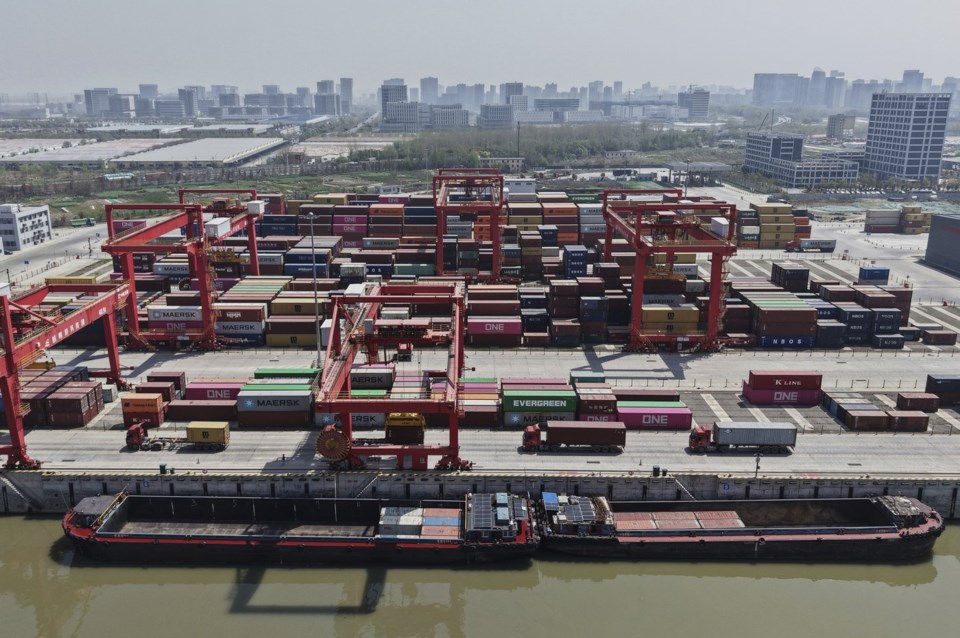BEIJING (AP) — China said Tuesday it would “fight to the end” and take countermeasures against the United States to safeguard its own interests after President Donald Trump threatened an additional 50% tariff on Chinese imports.
The Commerce Ministry said the U.S.‘s imposition of “so-called ‘reciprocal tariffs’” on China is “completely groundless and is a typical unilateral bullying practice.”
China, the world's second-largest economy, has taken retaliatory tariffs and the ministry hinted in its latest statement that more may be coming.
“The countermeasures China has taken are aimed at safeguarding its sovereignty, security and development interests, and maintaining the normal international trade order. They are completely legitimate,” the ministry said.
“The U.S. threat to escalate tariffs on China is a mistake on top of a mistake and once again exposes the blackmailing nature of the US. China will never accept this. If the US insists on its own way, China will fight to the end," it added.
Trump's threat Monday of additional tariffs on China raised fresh concerns that his drive to rebalance the global economy could intensify a financially destructive trade war. Stock markets from Tokyo to New York have become more unstable as the tariff war worsens.
Trump’s threat came after China said it would retaliate against U.S. tariffs he announced last week.
“If China does not withdraw its 34% increase above their already long term trading abuses by tomorrow, April 8th, 2025, the United States will impose ADDITIONAL Tariffs on China of 50%, effective April 9th,” Trump wrote on Truth Social. “Additionally, all talks with China concerning their requested meetings with us will be terminated!”
If Trump implements his new tariffs on Chinese products, U.S. tariffs on Chinese goods would reach a combined 104%. The new taxes would be on top of the 20% tariffs announced as punishment for fentanyl trafficking and his separate 34% tariffs announced last week. Not only could that increase prices for American consumers, it could also give China an incentive to flood other countries with cheaper goods and seek deeper relationships with other trading partners, particularly the European Union.
On the streets of Beijing, people said they found it hard to keep track of all the announcements, but expressed belief in their country's ability to weather the storm.
Trump says one thing today and another tomorrow. Anyway, he just wants benefits, so he can say whatever he wants," said Wu Qi, 37, who works in construction.
“I’m not really worried ," Wu said “Our country is not afraid. Of course, I think the goal should be to minimize harm to ordinary people,.”
China still has a range of options to strike back at the Washington, experts said, including suspending cooperation on combating fentanyl, placing higher quotas on agricultural products and going after the U.S. trade in services in China such as finance and law firms.
U.S. total goods trade with China were an estimated $582 billion in 2024, making it the top trader in goods with the U.S. The 2024 deficit with China in goods and services trade was between $263 billion and $295 billion.
In Hong Kong, where stocks were slightly higher Tuesday, Chief Executive John Lee blasted the latest U.S. tariffs as “bullying,” saying the “ruthless behavior” has damaged global and multilateral trade and brought great risks and uncertainties to the world.
Lee said the city would link its economy closer to China’s development, sign more free trade agreements, attract more foreign companies and capital to Hong Kong, and support local enterprises in coping with the impact of the tariffs.
___
Associated Press writers Chris Megerian and Josh Boak in Washington, Christopher Bodeen in Taipei, Taiwan, and Kanis Leung in Hong Kong contributed to this report.
The Associated Press



